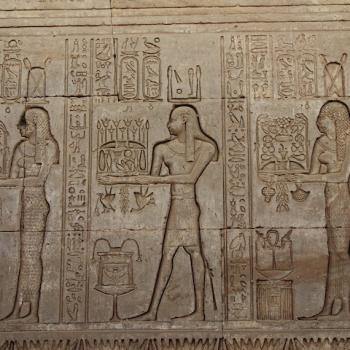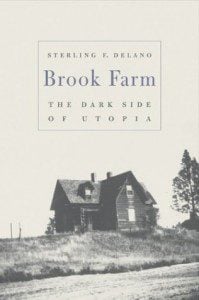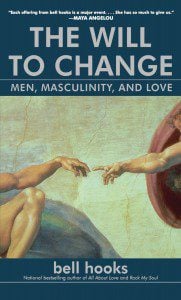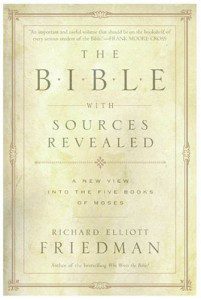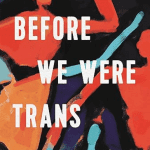1 Now the serpent said to the woman, “Did God say, “You shall not eat from any tree in the
garden’?” 2 The woman said to the serpent, “We may eat of the fruit of the trees in the garden; 3 but God said, “You shall not eat of the fruit of the tree that is in the middle of the garden, nor shall you touch it, or you shall die.’ ” 4 But the serpent said to the woman, “You will not die; 5 for God knows that when you eat of it your eyes will be opened, and you will be like God, knowing good and evil.” 6 So when the woman saw that the tree was good for food, and that it was a delight to the eyes, and that the tree was to be desired to make one wise, she took of its fruit and ate; and she also gave some to her husband, who was with her, and he ate. 7 Then the eyes of both were opened, and they knew that they were naked; and they sewed fig leaves together and made loincloths for themselves.
Note: This sermon is part of an ongoing series tracing “The Book of J” strand of Genesis.
In many Christian circles, conventional wisdom holds that humans were “cursed” with original sin when — approximately 6,000 years ago — the first two human beings, Adam and Eve, ate the forbidden fruit. The alleged result was the so-called “fall” of humanity from Paradise. There are places in the Apocrypha and in the New Testament that support this view, although a theology of the “Fall” and “Original Sin” did not become dominant until the writings of Augustine in the 4th century, more than three centuries after the life of Jesus and more than a thousand years after the story of Adam and Eve was first recorded. But the original authors and audience of Genesis 3 did not understand the story in this way. Also, neither Judaism nor the Eastern Orthodox strand of Christianity has a tradition of reading Genesis 3 as being about a “Fall from Grace” or about “Original Sin.”
Indeed, although we will not get to the story of Cain and Abel until next week, it is important to note that the Hebrew word for “sin” is not used at all in the first three chapters of Genesis, and eating from the tree is never declared “sinful” in the text. The word “sin” first appears in Genesis 4:7 about the first murder. Many of us in the West have inherited a way of reading the Bible that is heavily influenced by both Augustine and Martin Luther, who imposed their own issues with guilt and sin onto the Bible’s earliest chapters. So, what I want to invite us to experiment with laying aside what we think (or have been taught) that Genesis 3 is about, and closely read for ourselves what the text actually says.
For example, if I asked, “What kind of fruit did Adam and Eve eat?” The most common response would be “an apple.” But look closely: the text talks generically about the “fruit from the tree.” It never specifies the type of fruit. It could’ve been a banana! Or perhaps more likely a pomegranate. But the immediate image in our minds of an apple comes from centuries of religious art depicting the fruit as an apple. This artistic choice, in turn, perhaps came from the linguistic coincidence that the word “evil” in Latin is a homonym for the Latin word for “apple.” Although Genesis 3 was originally written in Hebrew, about the same time that a reading of this text as about Original Sin and the Fall was being popularized, Rome was also conquering the world and establishing Latin as a lingua franca.
In my opinion, which I had inherited from the scholarship of many others, Genesis 3 is a deeply true universal story about the human condition, even though this precise series of events never happened historically. It’s a story about growing up, becoming aware of good and evil, and learning that our actions have consequences. It’s a tale about that instant when the veil of childhood innocence drops away for the first time and we realize our mortality; it’s about that moment in time when we realize that we too are someday going to die.
The story in Genesis 3 has this and so many more universal resonances. The text says that, “When you eat of it your eyes will be opened, and you will be like God, knowing good and evil.” Rabbi Harold Kushner has written about how this story speaks a universal truth of the experience of parents everywhere: “how frustrating it is to be like God, to create something and then give up control of what you have created, to want something to turn out as perfectly as you pictured it in your mind and then see how far short the reality falls from your original intention.”
So we can begin to see these early chapters of Genesis as attempts to explain why the world happens to be in the curious state in which we find it. Genesis 3 seems written to explain questions like, “Why don’t snakes have legs?” “Why are humans afraid of snakes?” “Where did sexuality come from?” “Why do humans wear clothes?” “Why do women have labor pains at childbirth?” “Why do we have to work?” “Why is their good and evil?” and “Why do we have to die?”
If we read the text closely, especially in Hebrew, there are many more subtleties. The Hebrew word for knowledge — as in the Tree of the Knowledge of Good and Evil” — is yada. That word yada can also be a euphemism for sexual intercourse, such as in Genesis 4:1, “Now the man knew his wife Eve, and she conceived and bore Cain….” So this tale in Genesis 3 about biting into the fruit of the Tree of the Knowledge of Good and Evil is also about that transition into puberty, when our bodies come to fruition. At adolescence our bodies thrust us — without our consent — from the innocence of carefree childhood nakedness, running around in a sprinkler in the front yard without any clothes on and without shame, into the carnal knowledge of sexuality. Suddenly our bodies are changing, we’re growing, there is hair sprouting in places we didn’t have hair before, and we become self-aware of our nakedness in a way that we weren’t before. Through this lens of sexual awakening, we can see fresh meaning in this classic story: “Then the eyes of both were opened, and they knew [yada] that they were naked; and they sewed fig leaves together and made loincloths for themselves.” Genesis 3 is a deeply true coming of age story that happens everywhere, even though this precise series of events never happened historically.
Having called into question the validity of Genesis 3 as legitimizing a theology of “Original Sin” or as describing a historical “Fall from Grace,” I invite you to remember our Advent study of Matthew Fox’ seminal book Original Blessing. Along these lines, interpreters have written about how we can understand Genesis 3 for the twenty-first century:
If we embrace the idea that humans are not originally sinful but rather originally blessed and endowed with the ability to choose good over evil, then how we live our lives must change. We must be held accountable for the wrongs we do. The defense of “I’m only human” never has been an adequate excuse. Rather, when humans choose the evil over the good, the accusation should be: “How could you do this? After all, you’re human, you’re created in the image of God?” We must hold ourselves to a high standard, living as those who reflect the Divine in the world.”
These prophetic words are a prime example of how Genesis 3 is a story that continues to be relevant to our lives in the twenty-first century. This reading is a strong example of how we can take the Bible “seriously, but not literally.”
As we continue to move through these early chapters of Genesis, I will be inviting you to consider that the first part of Genesis, specifically chapters 1-11, are myth, not history. They are primeval stories meant to answer questions such as “How was the world created?” “Who were the first humans?” “Why do we live in cities?” and “How did we get so many languages?” And there is deep universal wisdom still to be gleaned from these ancient myths. As biblical scholar John Dominic Crossan likes to joke, starting with the Enlightenment, “We began to think that ancient peoples told dumb, literal stories that we were now smart enough to recognize as such. Not quite. Those ancient people told smart, metaphorical stories that we were now dumb enough to take literally.”
Rabbi Harold Kushner in an excellent book How Good Do We Have to Be? A New Understanding of Guilt and Forgiveness has said similarly:
I don’t take the story of the Garden of Eden as a newspaper report of an actual event (although I know that some people do), describing the human race as beginning with two full-grown, Hebrew-speaking adults and a talking snake. But I do believe that the story of the Garden of Eden tells us something profoundly true about the emergence of the human race…. The Garden of Eden is a tale, not of Paradise Lost but of Paradise Outgrown, not of Original Sin but of the birth of consciousness.”
This metaphorical, mythological, and archetypal way of reading the Bible’s earliest chapters is so much more exciting and compelling than more literal approaches. It also makes much more sense than asking question like, “Did Adam have a belly button? or “Where did Mrs. Cain come from?”
In closing, as a way of continuing to experience how these stories can still be sacred stories even if they aren’t historically true, I invite you to listen again to the relevant wisdom these stories still speak:
If we embrace the idea that humans are not originally sinful but rather originally blessed and endowed with the ability to choose good over evil, then how we live our lives must change. We must be held accountable for the wrongs we do. The defense of “I’m only human” never has been an adequate excuse. Rather, when humans choose the evil over the good, the accusation should be: “How could you do this? After all, you’re human, you’re created in the image of God?” We must hold ourselves to a high standard, living as those who reflect the Divine in the world.”
For Further Study
- James L. Kugel, How to Read the Bible: A Guide to Scripture, Then and Now
Notes
1 For more on “The Book of J,” see the first sermon in this series, “Preaching “The Book of J”: Are There Hidden Books in the Bible?” Available at http://www.patheos.com/blogs/carlgregg/2012/04/preaching-%E2%80%9Cthe-book-of-j%E2%80%9D-are-there-hidden-books-in-the-bible/.
2 “there are places in the Apocrypha and in the New Testament that support this view…of the “Fall” and “Original Sin” — To briefly trace some highlights of this passage’s “reception history,” Sirach 25:24 (c. 180 BCE) says, “From a woman sin had its beginning, and because of her we all die.” The apostle Paul (c. 60 CE) wrote in Romans 5:12 that “Therefore, just as sin came into the world through one man, and death came through sin, and so death spread to all because all have sinned” and in Romans 5:18 that, “Therefore just as one man’s trespass led to condemnation for all, so one man’s act of righteousness leads to justification and life for all.” 2 Esdras 7:118 (late 1st century, early 2nd century CE) says, “O Adam, what have you done? For though it was you who sinned, the fall was not yours alone, but ours also who are your descendants.”
3 Neither Judaism nor the Eastern Orthodox strand of Christianity has a tradition of reading Genesis 3 as being about a “Fall from Grace” or about “Original Sin.” — For many Jews, all people are subject both to the evil impulse [yetzer hatov] and to the good impulse [yetzer hara]. We cultivate a tendency toward choosing the good impulse by observing the commandments [mitzvot].
4 “inherited a way of reading the Bible that is heavily influenced by both Augustine and Martin Luther.” — For a landmark study of this influence, see Krister Stendahl, “The Apostle Paul and the Introspective Conscience of the West,” The Harvard Theological Review, Vol. 56, No. 3 (Jul., 1963), 199-215. For a more contemporary perspective, see Pamela Eisenbaum’s Paul Was Not a Christian: The Original Message of a Misunderstood Apostle.
5 “how frustrating it is to be like God” — see Harold Kushner, How Good Do We Have to Be? A New Understanding of Guilt and Forgiveness, 24.
6 The manuscripts from the sermon series on Matthew Fox’s Original Blessing: A Primer in Creation Spirituality are available at http://www.patheos.com/blogs/carlgregg/2012/02/sermon-series-retrospective-matthew-foxs-original-blessing-a-primer-in-creation-spirituality/.
7 interpreters have written about how we can understand Genesis 3 for the twenty-first century — The block quote is from Lisa Davison, “Saved from ‘Original Sin” DisciplesWorld, Vol 3, Issue 5, April 2004, 3-5.
8 “seriously, but not literally” — see Marcus Borg, The Heart of Christianity: Rediscovering a Life of Faith.
9 John Dominic Crossan, A Long Way from Tipperary : What a Former Monk Discovered in His Search for the Truth, 148.
The Rev. Carl Gregg is a trained spiritual director, a D.Min. candidate at San Francisco Theological Seminary, and the pastor of Broadview Church in Chesapeake Beach, Maryland. Follow him on Facebook (facebook.com/carlgregg) and Twitter (@carlgregg).






